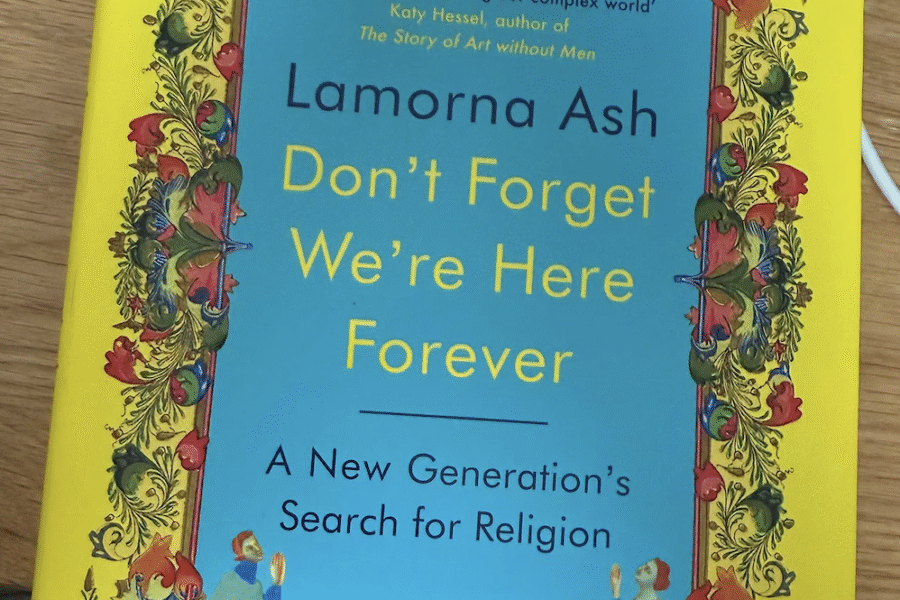A short review of Lamorna Ash’s new book
Karina Kreminski
Monday, 18 August 2025
Today, as I was leaving church, two very cool-looking young women were wandering about the foyer, looking up and down and around saying ‘Oh, this is a church. Wow’. So I said, ‘Hi. Did you want to come inside to take a look? You should see the ceiling mural – it’s really trippy’. ‘Oh could we?’ they replied. I said ‘sure’, then I opened the door for them, trusting that someone inside would simultaneously give them space to look around but also be present to chat with them if they wanted to.
It seems like more young adults are taking a peek at Christianity these days. At least that’s what the gossip is. It’s not a ‘revival’ in my thinking, whatever that means – not as some over-eager Christians would call it. But I do wonder if we are shifting in seasons, from deep scepticism of Christianity to a willingness to explore. And why? Well, what do young people have to lose? The world is a mess, so they might as well try anywhere to find hope. It has nothing to do with the work of the church, really; it seems to me more that ‘something is in the air’. Some might say God’s Spirit is wooing people to consider another option for finding meaning in a world full of pain.
I recently finished reading Don’t Forget We’re Here Forever by British writer Lamorna Ash. I’d heard about this book years ago and had it on my radar to take a look. In the end it came to me via audiobooks, and I’d recommend it in that medium to anyone. Lamorna reads beautifully and her prose is poetry.
This is the testimony of a 28-year-old woman living in the UK who didn’t give Christianity a thought until her two good friends ‘converted’. She was shocked that people still convert and that Christianity was still a thing. So, she decided to give herself the task of becoming a Christian in a year and to write about it. She interviewed Christians from different denominations, went to Christianity Explored courses, went on a monastic retreat, attended a YWAM camp, attended churches and interviewed Christians in their ‘second act’ (those who gave up Christianity once and then returned to it later on, i.e. they deconstructed and then reconstructed).
The book speaks tenderly to the times we live in. And it made me cry at different points in the story. This is a young woman’s genuine search for meaning, hope, spirituality and truth in a world that continually batters people into submission – into its demands for consumerism, distraction, fragmentation and overall capitalist formation. Lamorna is open, kind and sceptical about faith all at the same time. I was expecting much more cynicism but I didn’t detect that at all – and when she was cynical, she corrected herself. She genuinely wants to come to everyone with an open mind and a generous spirit.
Ash openly states that she and people her age are seeking, that they are not atheistic but the opposite – they want to believe in something other than what they see in the world around them. She wrestles with belief and faith and what Christianity is asking of her. She discovers that Christianity is not what she suspected – a monolithic entity – but is instead a diversity of stories that are open to interpretation, occupied by people from a myriad of contexts.
In the end, Ash opens up to faith – a kind of mystical faith, yet grounded. I’m not sure she’d call herself a Christian exactly, but she does feel different, more patient she says, kinder, with a sense of calm and with less of a focus on her own problems. Towards the end of her journey, she settles into church attendance through Quaker meetings and more liturgical services, as she feels that the more charismatic services she attended were too contrived and the leaders inclining towards manipulation. She even puts her faith into practice towards the end when her mother is diagnosed with dementia. She begins to pray. It’s an understatement to say there is a lot going on in this book.
It’s a stunning piece of work.
I am hoping that the church is listening to Lamorna and others. For too long we have been concerned for ourselves – for the institution of the church – and have forgotten how to interact with and listen to society, with its mess and beauty and questions and longing for mystery. As I heard an older person, who has been a minister for decades, say in a denominational gathering recently, ‘I wish I had spent more time in the pub rather than inside the church’. He meant that he felt he should have spent more time listening to and being with people outside the church, with all their longings and questions and lived experiences, and learning from and with them, conversing and sharing anything good that he had to share – together with them.
Will we respond sensitively to these longings for meaning that are surfacing in our generation?
Read (or better still, listen to) this book if you can.
Rev. Dr Karina Kreminski has worked in English teaching and journalism. She has been a Senior Minister in the Church and was Missiology Lecturer at Morling College in Sydney. She writes and blogs about life, spirituality, mission and theology and is the author of Urban Spirituality: Embodying God’s Mission in the Neighbourhood (2018).
This review was originally published on 27th July 2025 at https://karinakreminski.substack.com/p/dont-forget-were-here-forever. Edited and republished with permission.
Want more thoughtful public theology? Follow us on Facebook and subscribe to Engage.Mail, Zadok and Equip.
